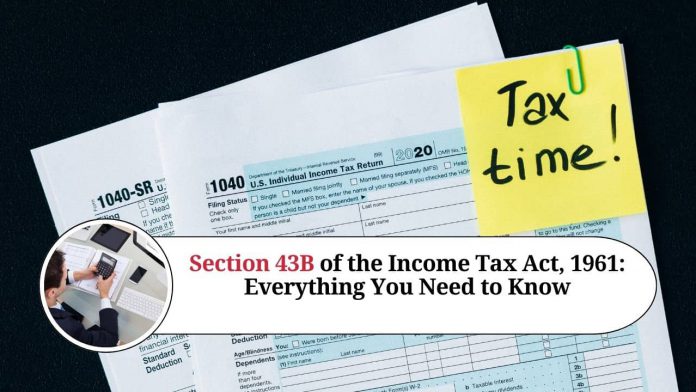Section 43B of the Income Tax Act, 1961 is an important provision that outlines the rules for the deduction of certain expenses for tax purposes. This section applies to both individuals and companies, and failure to comply with its provisions can lead to significant penalties.
In this blog post, we will explore Section 43B in detail, including its scope, provisions, and implications.
Scope of Section 43B
Section 43B of the Income Tax Act, 1961 applies to certain types of expenses that are incurred by individuals and companies. These expenses include:
- Statutory dues: This refers to any taxes, duties, cesses, or fees that are payable to the government, such as income tax, sales tax, excise duty, and service tax.
- Contributions to employee welfare funds: This refers to contributions made by an employer to any welfare fund for the benefit of employees, such as the Employees’ Provident Fund (EPF), the Employees’ State Insurance (ESI) Fund, and the Labour Welfare Fund.
- Contributions to approved superannuation funds: This refers to contributions made by an employer to an approved superannuation fund for the benefit of employees.
- Leave encashment payments: This refers to payments made by an employer to an employee for any unutilized earned leave at the time of retirement or resignation.
- Interest on loans: This refers to interest that is payable on any loan or borrowing taken for business purposes.
Provisions of Section 43B
Section 43B provides that the above-mentioned expenses can only be claimed as deductions for tax purposes in the year in which they are actually paid. This means that even if the expense has been incurred in a previous year, it cannot be claimed as a deduction until it is actually paid.
However, there are a few exceptions to this rule. For example, any contribution made by an employer to an approved superannuation fund can be claimed as a deduction in the year in which it is due, even if it is not actually paid until a later date. Similarly, any interest that is payable on a loan taken for the purchase of an asset can be claimed as a deduction in the year in which the asset is acquired, even if the interest is not actually paid until a later date.
Implications of Section 43B
The provisions of Section 43B have several important implications for individuals and companies. First and foremost, it is important to ensure that all statutory dues and other payments are made on time to avoid any penalties or interest charges.
Additionally, companies should ensure that they maintain accurate records of all payments made, as these will be required to claim deductions under Section 43B. Failure to maintain proper records can result in the disallowance of deductions and potential penalties.
Finally, it is important to note that the provisions of Section 43B only apply to certain types of expenses. Other expenses, such as salaries and wages, rent, and repairs and maintenance, are subject to different rules for deduction.
In conclusion
Section 43B of the Income Tax Act, 1961 is an important provision that outlines the rules for the deduction of certain expenses for tax purposes. It is important for individuals and companies to be aware of the scope and provisions of this section, and to ensure that they comply with its requirements to avoid any penalties or other consequences.
Other Related Blogs: Section 144B Income Tax Act
Frequently Asked Questions (FAQs)
Q.1 What is Section 43B of the Income Tax Act, 1961?
Section 43B of the Income Tax Act, 1961 is a provision that specifies the rules for the deduction of certain expenses for tax purposes.
Q.2 Which expenses are covered under Section 43B?
Section 43B covers expenses such as statutory dues, contributions to employee welfare funds, contributions to approved superannuation funds, leave encashment payments, and interest on loans.
Q.3 Can I claim a deduction for an expense that was incurred in a previous year but not paid until the current year?
No, under Section 43B, an expense can only be claimed as a deduction for tax purposes in the year in which it is actually paid.
Q.4 Are there any exceptions to this rule?
Yes, there are a few exceptions. For example, any contribution made by an employer to an approved superannuation fund can be claimed as a deduction in the year in which it is due, even if it is not actually paid until a later date. Similarly, any interest that is payable on a loan taken for the purchase of an asset can be claimed as a deduction in the year in which the asset is acquired, even if the interest is not actually paid until a later date.
Q.5 What are the implications of Section 43B for individuals and companies?
Individuals and companies must ensure that all statutory dues and other payments are made on time to avoid any penalties or interest charges. Additionally, they should maintain accurate records of all payments made to claim deductions under Section 43B.
Q.6 Can I claim a deduction for salaries and wages under Section 43B?
No, salaries and wages are subject to different rules for deduction under the Income Tax Act.
Q.7 What happens if I fail to comply with the provisions of Section 43B?
Failure to comply with the provisions of Section 43B can result in the disallowance of deductions and potential penalties.




















